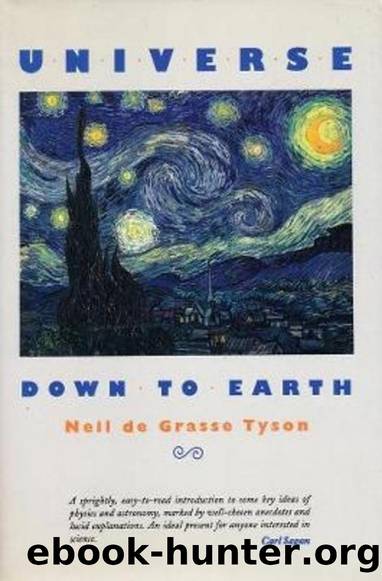Universe Down to Earth by Neil DeGrasse Tyson

Author:Neil DeGrasse Tyson [Tyson, Neil DeGrasse]
Language: eng
Format: epub
ISBN: 9780231075602
Google: 0w3XwAEACAAJ
Barnesnoble:
Goodreads: 1653035
Published: 2021-02-23T14:38:51+00:00
Shapes of Radiation
139
glows (visibly or invisibly) from being heated-black vinyl car seats included .
If tungsten, the Sun, and black vinyl car seats do not make a complete enough list for you, then consider the biggest black body of them all: the cooled remains from the primeval fireball of the big bang. This omnipresent radiation field of the universe is extremely well-fitted by a black body spectrum whose temperature is a mere 3 kelvins, which is why a single temperature can be assigned to the entire universe.
As noted in chapter 7, this is the famous â3 degree backgroundâ that peaks in the microwave part of the spectrum.
A physical understanding of the black body spectrum was first realized through the efforts of Max Planck, a German physicist and the 1918 Nobel Laureate in physics. On December 14, 1900, Planck presented a derivation of the Black Body Radiation law at a meeting of the German Physical Society in Berlin, which assumed that heated (and thus vibrating) matter emits photons with discrete and quantized energies. This new âquantumâ concept provided one of the earliest hints that the new branch of physics, which grew to be known as quantum mechanics, was fast-approaching. So as not to slight Planck in favor of Wien, Stefan, and Boltzmann, I present Planckâs radiation formula. It precisely describes the energy (shape) of black body radiation at every location on a plot, which heralded a new fundamental constant, h, that now bears his name, if not his initial: I
1
E(A, n ex: As X e<hc!AkT) _ 1
The classical â11A5â part was known to Wien and others, but Planckâs quantum adjustment of âl/(e(hc/AkD _ J)â was brand new. The symbol E represents the energy emission rate in photons, A is the Greek letter lambda that represents the
140 S O M E U N I F Y I N G I D E A S I N T H E P H Y S I C A L U N I V E R S E
photon wavelength, T is the temperature of the object, e is the exponential constant 2. 71828 ⦠, c is the speed of light, and k is a constant named after Boltzmann that allows the conversion of temperature units into energy units.
With some basic and some flashy calculus, you can actually derive Wienâs law and the Stefan-Boltzmann law from Planckâs radiation formula, but we will not do that here.
Reflections
There is no need to be upset that glowing, heated objects can only appear red, white, or blue. In the cool world of reflected light, one can be quite choosy about the colors of objects. When selecting paint for your house, or when selecting a flavor of Jell-0, there is (or seems to be) an uncountable number of colors from which to choose. Surface texture, pigments, and dyes all act selectively to reflect back a particular set of photons that you identify as a unique color. Parsley looks green only because the light that shines on it contains green photons (such as green light or white light) that are reflected back to you.
Download
This site does not store any files on its server. We only index and link to content provided by other sites. Please contact the content providers to delete copyright contents if any and email us, we'll remove relevant links or contents immediately.
A Brief Introduction to Classical Mechanics with Illustrative Problems (181 Pages) by Shahen Hacyan(307)
ASTROPHYSICS FOR NON-MATHEMATICIANS by Unknown(304)
Physics in Minutes by Giles Sparrow(283)
Calculus - Single and Multivariable 6th ed. by D. Hughes-Hallett(266)
Modern Physics by Gary N. Felder and Kenny M. Felder(265)
Understandable Statistics. Concepts and Methods by Charles Henry Brase Corrinne Pellillo Brase Jason Dolor James Seibert(262)
Fundamentals of Physics I by R. Shankar;(246)
Meat Less: The Next Food Revolution by David Julian McClements(239)
A History of Mathematical Impossibility by Lützen Jesper;(234)
Iraq at the Crossroads by Toby Dodge(233)
Principles of Modern Chemistry by David W. Oxtoby H.P. Gillis & Laurie J. Butler(227)
Probabilistic Risk Analysis and Bayesian Decision Theory by Marcel van Oijen & Mark Brewer(226)
Practical Math Success in 20 Minutes a Day by Mark A. McKibben(220)
Plots, transformations, and regression : an introduction to graphical methods of diagnostic regression analysis by Atkinson A. C. (Anthony Curtis)(215)
Fundamentals of Mathematical Statistics by Steffen Lauritzen(215)
A Mathematician Comes of Age by Krantz Steven G(213)
The Parrot in the Mirror by Antone Martinho-Truswell(212)
Understanding the Universe: From Quarks to the Cosmos (591 pages) by Don Lincoln(212)
Sensory Ecology, Behaviour, and Evolution by Stevens Martin;(210)
